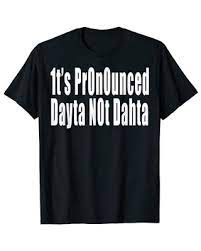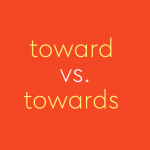Today's column is about the written word, but hang on: the first part is about pronunciation.
One of my quirks is, I don't watch network TV except for the news. What I do watch are movies on DVD and Netflix and Amazon Prime. That's probably because of my age; I wish I could say it's because I'm too intelligent to get into these current reality shows and sitcoms, etc.--but that's not true, because you should see some of the movies I watch. My wife just rolls her eyes.
My point is, I do watch the nightly news and during those broadcasts I've found myself thinking about the way anchors and reporters pronounce certain words. My favorite is data. There are two different ways to say it: dayta and datta. As an IBM retiree, I pronounce it dayta--and while I realize either way is right, datta remains one of my pet peeves. Another funny word is short-lived. Almost every weatherman says short-livved, with a short i as in give. I prefer a long i, because it's describing something that has a short life. But I've given up on that one, since no one else in this solar system seems to agree with me. Other words that mean the same thing but can be pronounced two different ways: gala, vase, electoral, either, neither, caramel, etc. And while we're on this, how do you pronounce omicron? Oh or ah? I'm leaning toward oh.
Enough pronunciation. Something all of us can relate to is the way we spell certain words, in our writing. Most spelling is either correct or incorrect, period, but some words can have more than one acceptable spelling. I'm talking about variant spellings here, not regional spellings like neighbor/neighbour or archaic spellings like jail/gaol.
So . . . I've come up with some of those, as follows. Again, all of them can be spelled either way, usually without incurring an editor's wrath, but what I'd like you to do is consider which way you would choose to spell them in a story or novel. I've even included a few variant phrases, at the end.
NOTE 1: Some of these do involve regional spellings, usually American vs. British, but I've tried to avoid the truly obvious ones like center/centre, color/colour, etc. Also, not that it matters, for each one I've put my preference first.
Here goes:
axe/ax
whiskey/whisky
okay/OK
mike/mic (as in microphone)
toward/towards
theater/theatre
woolen/woollen
racket/racquet (as in tennis)
sulfur/sulphur
T-shirt/tee-shirt
barbecue/barbeque
queasy/queasey
wintry/wintery
lit/lighted
installment/instalment
likable/likeable
wrack/rack (as in your brain)
fulfill/fulfil
mustache/moustache
donut/doughnut
dialogue/dialog
jibe/gibe
hurray/hooray
curtsey/curtsy
amok/amuck
counselor/counsellor
flier/flyer (as in pilot)
linchpin/lynchpin
omelet/omelette
dreamed/dreamt
leaped/leapt
dove/dived
disc/disk -- At IBM, storage devices were disks; things frisbeelike or slipped were discs.
advisor/adviser
traveling/travelling
among/amongst
amid/amidst
yogurt/yoghurt
collectible/collectable -- I think of this as deserves to be collected vs. is able to be collected
crawfish/crayfish
hippie/hippy
adrenaline/adrenalin
forgo/forego
duffle/duffel
speak English/speak in English
can not/cannot
I couldn't care less/I could care less
for example/for instance
NOTE 2: I believe there's a rule about traveling/travelling, cancel/cancelling, controling/controlling, etc.: If the accent is on the second syllable, double the final consonant; if the accent is on the first syllable, don't double the final consonant. So traveling, canceling, and controlling would be correct. I think.
Some of these spellings are up in the air (fliers/flyers?), and I often change my mind about them. I can remember several times when I used duffel bags in one story and duffle bags in another. Same goes for adrenaline/adrenalin, barbecue/barbeque, queasy/queasey, theater/theatre, dialogue/dialog, installment/instalment, mustache/moustache, hurray/hooray, and a few others. I seem to go back and forth.
What's your opinion? Do you think some of these that I've called variant really aren't? What are your preferences--or peeves, if you feel strongly enough about them? Can you supply other variant words or phrases I've missed?
Now . . . I think I need a donut.



John, for your first list, I offer envelope, root, and route.
ReplyDeleteFor your second list, I suggest whilst and cigarette.
It strikes me the word ‘madding’ should fall into some unique list in that it can be replaced with madly and maddening.
“I could care less” is an incorrect version of the form, “I could not care less.” I seem to recall one or two of our colleagues addressed this.
John, a friend once advised that the pronunciation of vase depends upon the price: A 'vahze' is a very expensive 'vace'.
HA! Don't know how I missed those, Leigh. I myself say rowt instead of root most of the time, but not always, and I know folks who always say ONvelope while I say INvelope. And "madding" has always made me want to be far from the madding crowd, whatever or wherever that is.
DeleteYep, I remembered something about "could care less" at SleuthSayers but couldn't recall the exact piece. It is indeed an incorrect expression but I hear it all the time.
I love your friend's explanation about the punctuation of vase. I don't own any vahzes.
Thanks as always!
"I could care less" I first encountered this in The Army in Japan 1964-65. At the time it made sense, because "I could care less" was a derivative of "I couldn't care less" meant to up the power of the comment. The spoken English was strange because of the isolation from "real" life. It was full of military acronyms and slang, and "new" ways to say things were quickly adopted and spread throughout the community. "I could care less" was the newer, ironic, cool way to say "I couldn't care less." It was then repeated to he point it no longer meant anything.
Delete"You say neither and I say neither..."
ReplyDeleteHey Jeff! I don't say nigh-ther, and neether do I say eye-ther. Maybe this is one of those words like vase--I suspect Lady Grantham on Downton Abbey would say vahze and nigh-ther, while Sheriff Roscoe P. Coltrane (and I) would probably say vace and neether. This stuff is fun.
DeleteI hope all's well in your world.
I'm quoting Gershwin! How could things be better! :) Hope all is well with you and yours! Merry Christmas!
DeleteI know. And yep, all's well here, and I hope with you also. Merry Christmas to you too, and thanks for the quote and the support you've always given us here at SleuthSayers!
DeleteI am so with you on mike/mic. I hate the wrong one, mic. It's like fridge for refrigerator. We don't say or write frig. It's fridge and should be mike. Otherwise I have to read frigg and mick.
ReplyDeletecj Sez: I'm with you, Kaye.
DeleteKaye, I betcha mic is probably the preferred way of spelling it, from all the novels and stories I've read lately that use it. But I too think it should be mike. (Fridge is indeed a good example.) When I read mic I think MICK, as in Crocodile Dundee, and it throws me off for a second.
DeleteMicrophones have been around a long time, but unless I'm mistaken, the written "mic" is a relatively new term.
It's preferred for now, but I see mike gaining some ground. I'm rooting for him! I mean it. I think it got started when people had to figure out how to write "mike drop." And figured it out wrong, IMO.
DeleteYou're probably right, Kaye, about the timing.
DeleteTo me, that kind of shortening of a word should at least sound like the original word.
I remember reading "mic' as far back as the late 70s. And "mike" turns up in the late thirties in the issue of Whiz Comics that introduced Captain Marvel!
DeleteJeff--you're always teaching me something. I didn't remember hearing "mic" long ago--but I do recall seeing the word "mike" for microphone a few times in the old days.
Deletecj Sez: Morning, John. You touched on so many of my peeves/preferences. I do want to add that when I want emphasis, I will use "I can not" because as one word, it seems weak. I have read is don't make fun of how "some" people pronounce a word because they may have never heard it...only read it. Texting and tweeting have ruined our long-lived abbreviations.
ReplyDeleteGood points, cj. As for texting, OMG, who needs to spell anymore? LOL!!! Someone needs to do a post just about that.
DeleteThanks for stopping in (and for agreeing with Kaye and me on mike/mic).
Before I was born my paternal grandmother ran a floral shop. My father used to say that when a customer came in to purchase a gladiola for an arrangement my grandmother would charge 50 cents if they asked for a "glad ee oh lah". But if they asked for a "glad EYE oh lay" well, the charge was a buck fifty.
ReplyDeleteHa!! Great story, Dale. I think I would've liked your grandmother.
DeleteOh, John, this hit a nerve with me. I'm dyslexic and have always had a terrible time with spelling (thankfully, I now have spellcheck), but certain things drive me crazy. Toward and towards. One of my critique partners uses towards all the time. I have told her so many times that towards is British and toward is American. That mike and mike/mic is another one I never remember and tee shirt or T-shirt (I've used them both. LOL) OK drives me crazy, I prefer okay , thank you very much. When it really gets me is when editors of anthologies use both because the submitting authors used both. If I'm editing an anthology. I change all the OKs to okay (unless your protagonist is writing a text)and all the towards to toward. I guess I should say that besides being dyslexic, I'm a perfectionist Virgo. I could go on, but I'll stop now. Loved this column!
ReplyDelete\
DeletePat, I like 'toward' also, in the stories I write, but almost every weatherperson I've seen on TV uses towards (many many times per broadcast, usually). As for mike/mic, I suppose (as we've said) either is fine, but I prefer mike, and the same goes for okay/OK/O.K./ok. I guess the most important thing is to choose one usage and be consistent with it throughout, at least in the same story or novel.
DeleteI agree with you about separate stories in an anthology--I think it's distracting if story 1 uses a word one way and story 2 uses it another.
The only sure thing about all this is that we all have our individual preferences!
In grade school, my teacher marked me down for writing "donut". This was when Dunkin was still emphasizing that they sell donuts.
ReplyDeleteI wish a Dunkin employee had been around to back you up, Elizabeth!
DeleteIn my writing classes I was always careful to try to allow these variant spellings in the student manuscripts I critiqued, although I certainly had my own preferences. The differences I saw most included the various ways of writing 'okay.'
Me, I spell it "O.K." To each his own, I guess!
DeleteElizabeth, I just finished Lee Child's latest novel (a few minutes ago), and he used "OK" throughout the book. Lots of ways to write it.
DeleteThese are conundrums, and I agree that avoidance is often the best path.
ReplyDeleteRight now, I'm writing a story with a first person Canadian POV. Having him say "harbor" feels wrong vs. "harbour." So I'm making sure I either avoid potential spelling shifts or recognize where to change things.
Ha!--Avoidance might BE the best path, Bob.
DeleteThe spelling shifts would indeed be my concern, in the story you're working on. I'm afraid I'd goof up and use an American spelling in one instance and a Canadian spelling in another.
Donut? Never. Doughnut, please.
ReplyDelete